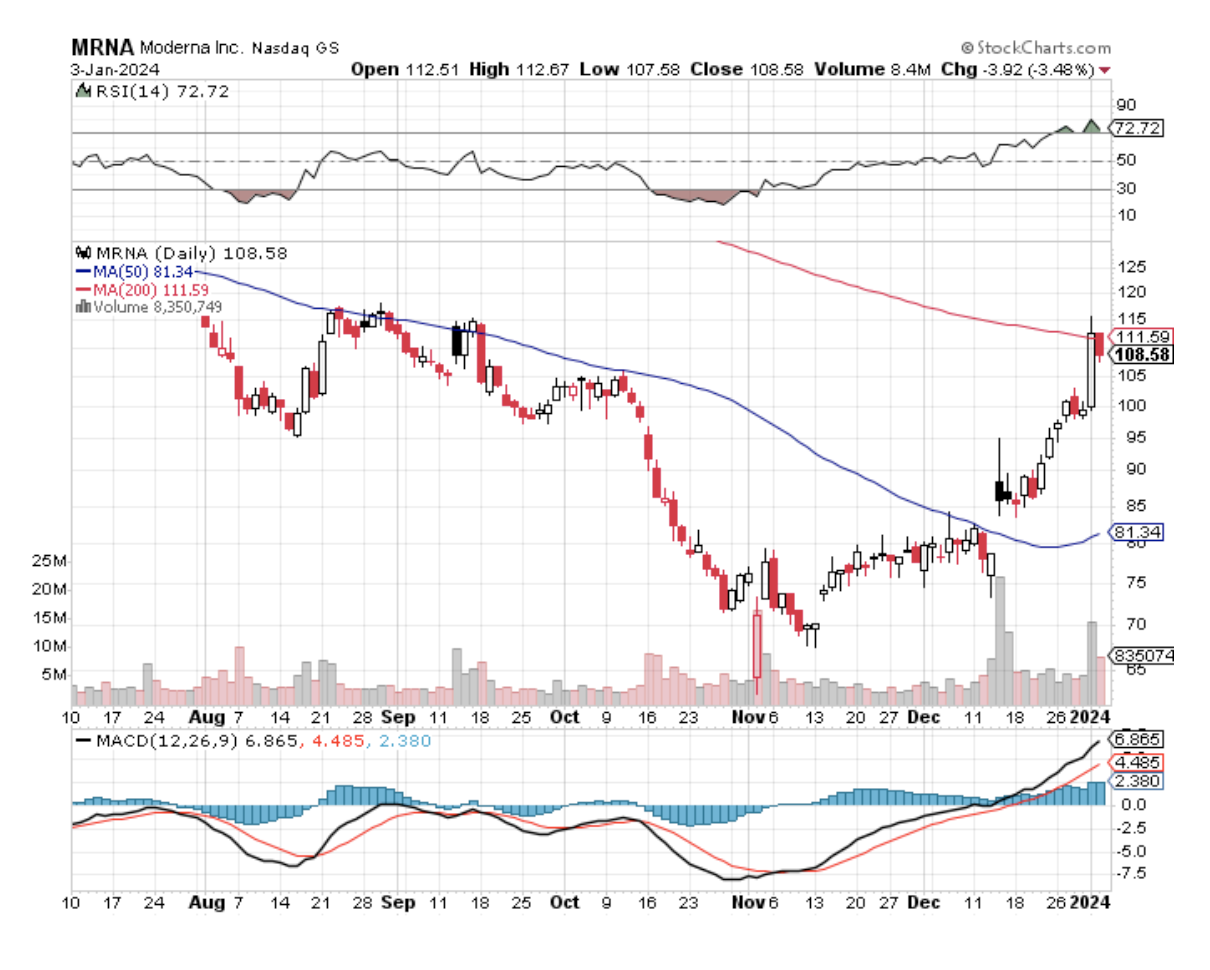A Turnaround Tale Worth Watching
Let's take a step back and get a bird's-eye view of what's shaking up in the biotech world.
Remember Moderna (MRNA)? The big shot of the Covid-19 vaccine saga? It’s suddenly back in the spotlight.
After a year that saw its shares nosedive by 45% — landing it in the not-so-coveted spot of one of 2023's worst S&P 500 performers — things are looking up. And, boy, are they looking up!
Moderna's woes weren't just about falling vaccine sales. Oh no, it was more than that. They had to scale back their manufacturing footprint, trimming costs left and right. The company doesn't see itself breaking even until 2026, but who's rushing?
Now, here's where it gets interesting. Moderna's not just sitting around licking its wounds. They've been busy bees, pouring money into their mRNA-based product pipeline. And guess what? It's starting to look like money well spent.
December brought some news that made investors sit up straight. In partnership with Merck (MRK), Moderna's cooking up a cancer treatment that's looking pretty darn promising. And it's not just any partnership.
We're talking about combining forces with Merck's Keytruda, the oncology heavyweight, raking in a cool $20.9 billion in 2022.
Moderna's mRNA-4157, however, is the new kid on the block. It's a custom-tailored cancer vaccine, shaping up to be a real game-changer. The idea? Target each patient's cancer uniquely, making it a one-two punch with treatments like Keytruda.
The latest data? It's the stuff of dreams. High-risk melanoma patients showed a 49% drop in cancer recurrence or death risk and a 62% plunge in distant metastasis or death risk. All this without ramping up severe side effects. The phase 3 trial is already on the drawing board and the scope? It's widening.
And, let's not forget the big picture. In 2020, around 325,000 cases of malignant melanoma were diagnosed.
If Moderna and Merck hit the bullseye with their candidate, they're looking at a vast market to tap into. And if this duo outperforms Keytruda alone for certain conditions, we're talking serious revenue potential.
Needless to say, these developments hint at a future where Moderna's not just about Covid-19 jabs. By 2026, this biotech company is projected to have a lineup of at least five products.
But why this sudden investor love? Part of it is the resurgence of COVID-19 cases and a new variant, JN.1, causing a stir. Adding to these are clearer visibility on vaccine sales and a more structured expense outlook.
On the back of these developments, Moderna's shares leaped 13% to $112.57. That's their best day since December 13, 2022, when they soared 20%. Meanwhile, Pfizer (PFE), their vaccine rival, saw a modest 3.8% bump in roughly the same period.
The broader Wall Street narrative? It's echoing optimism for Moderna. The average price target sits at $126.72, with shares currently hovering around $100. It's a glimpse of potential gains for the vaccine maker.
Clearly, Moderna is no longer just a one-trick pony. More importantly, their shares are currently a bargain, sporting a P/E ratio of just 7 against the market average of 26. This might be riskier than your usual index fund investment, but the growth potential? It's likely being underestimated.
Short-term, Moderna might see more dips as its Covid-19 vaccine windfall wanes. But long-term, their collaboration with Merck, along with other pipeline projects, spells growth.
Come 2025, Moderna's management is betting on a growth rebound, eyeing break-even by 2026. By 2028, they're aiming to add 15 more medicines to their arsenal. And with $7.6 billion in cash and equivalents, they're set to weather the storm without diluting shareholder value.
So, should you buy into Moderna now? It's not a half-bad idea.
If you're the patient type, ready to ride out some short-term turbulence for potential long-term gains, then Moderna's current narrative might just be your kind of investment story.


